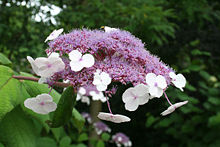Hydrangea aspera
| Hydrangea aspera | |
|---|---|
 |
|
| Scientific classification | |
| Kingdom: | Plantae |
| (unranked): | Angiosperms |
| (unranked): | Eudicots |
| (unranked): | Asterids |
| Order: | Cornales |
| Family: | Hydrangeaceae |
| Genus: | Hydrangea |
| Species: | H. aspera |
| Binomial name | |
|
Hydrangea aspera Buch.-Ham. ex D. Don Prodr. fl. nepal. 211. 1825 |
|
| Subspecies | |
|
H. a. subsp. aspera |
|
H. a. subsp. aspera
H. a. subsp. robusta
H. a. subsp. sargentiana
H. a. subsp. strigosa
Hydrangea aspera is a species of flowering plant in the family Hydrangaceae, native to the region between the Himalayas, across southern China, to Taiwan. It is a large, erect deciduous shrub growing to 3 m (10 ft)] tall and wide, with broadly oval leaves. The flowers are typically borne in large flat heads in late summer, and are in variable shades of pale blue and pink, fringed by white or pale pink sterile florets.
The Latin aspera means "rough-textured" and refers to the downy lower surface of the leaves.
Considerable natural variation occurs in the species, some of which are sometimes considered to be separate species; these include H. aspera ssp. sargentiana and H. aspera ssp. villosa.
The plant is widely cultivated, and favours a sunny, sheltered position in acid or neutral soil. Numerous cultivars have been produced as ornamental subjects for parks and gardens. They include:-
The cultivar H. aspera 'Macrophylla' (not to be confused with H. macrophylla) has gained the Royal Horticultural Society's Award of Garden Merit.
...
Wikipedia
